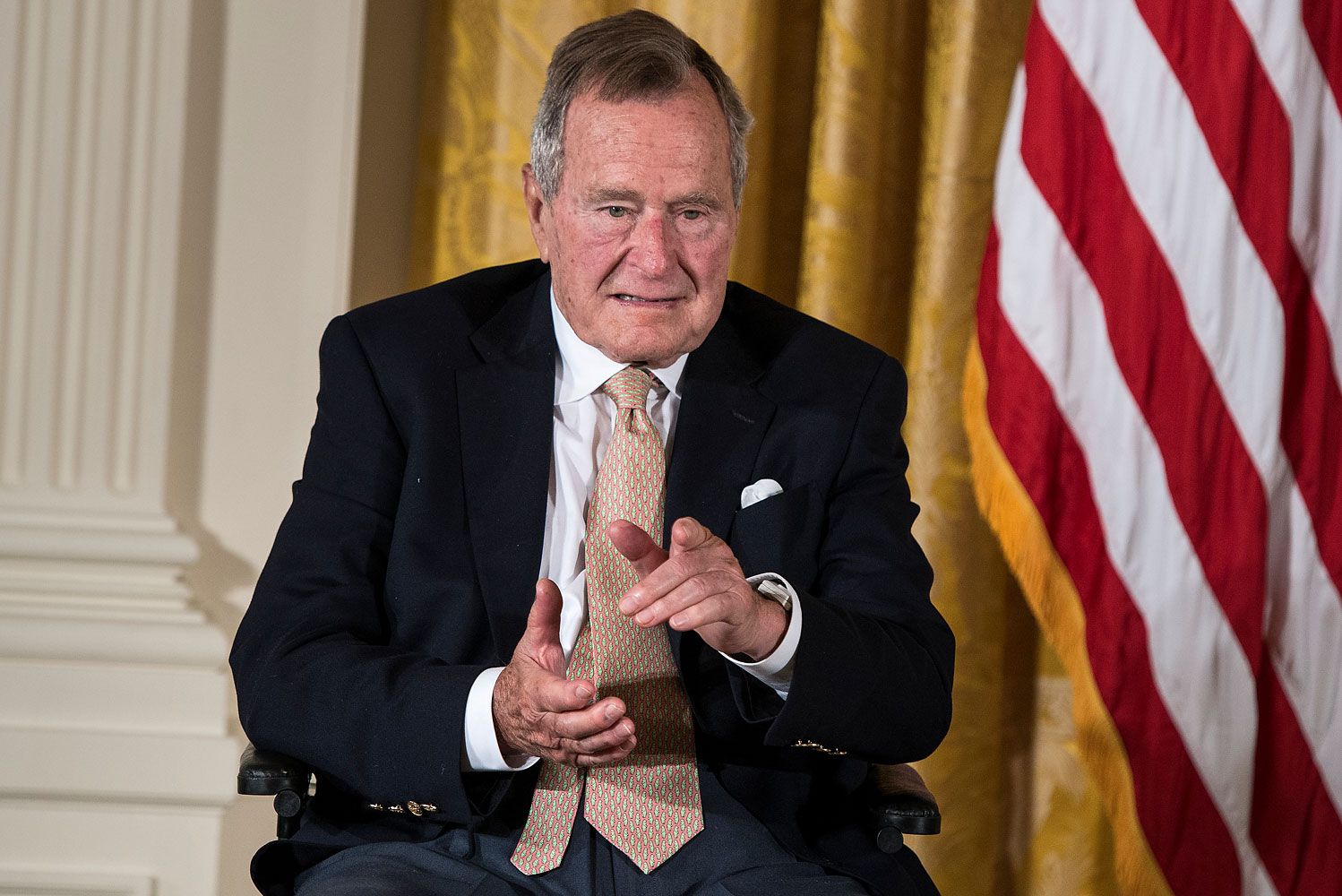
He loved it all—the friendly, eager faces, older now; the war stories, remembered, but not too much, with advantage; the barbecue and the country music and something new, the selfies, through which he gallantly grinned, delighted to be in the thick of things again. But then George Herbert Walker Bush has always been happiest in a swirl. Last weekend, during a three-day celebration at his presidential library in College Station, Texas, of the 25th anniversary of his 1989 inauguration, he was asked how he liked the flood of warmly generous words about his time at the pinnacle of American power. “Hard to believe,” the former president said in a voice hoarse with age. His eyebrows rose mischievously. “It’s ‘kinder and gentler’ all over the place.”
Approaching his 90th birthday, confined to a wheelchair by a form of Parkinson’s that prevents his brain from telling his legs want to do, the 41st president of the United States is in the midst of a unique autumnal chapter of life, at once savoring a favorable shift in the popular view of his own administration’s performance while, in classically Bushian fashion, looking forward. Temperamentally disinclined to introspection or even much retrospection, Bush long ago adopted the view that no setback, particularly in the turbulent world of politics, is permanent. “Time,” he often says, “marches on.”
It is a congenial season for the Bushes writ large. As the years pass from the tumult of the first decade of the century, George W. Bush seems less polarizing, and his new display of paintings of world leaders at his own library, in Dallas, offers the country—or at least a small part of it—the opportunity to consider him in a different, less glaring light. Bush 41’s grandson, George P. Bush, the son of Columba and Jeb, is running a textbook campaign for land commissioner in Texas. (He won the GOP primary in March with 73 percent of the vote.) And most intriguing of all is whether George P.’s dad, Jeb, will seek the presidency in 2016, possibly setting up yet another Bush-Clinton race in what’s become the American version of the Wars of the Roses.
In an interview with Fox News’s Shannon Bream that closed the festivities in College Station, Jeb Bush spoke very much in terms his father appreciated. “We need … candidates that are organized around winning the election, not making points,” Jeb said. “Campaigns ought to be about listening and learning and getting better. I do think we’ve lost our way.” Bush 41 very much hopes Jeb will run; Barbara Bush has said on several occasions that she suspects Americans are tired of Bushes even as she asserts that Jeb would be the best imaginable president. In College Station Jeb said that he would decide on a bid by year’s end. “Can one do it joyfully?” he asked rhetorically.
It is the kind of question that his father answered in the affirmative over three decades in public life, from the 1964 U.S. Senate race in Texas through the grim 1992 re-election bid. Often seen as a reluctant campaigner, George H.W. Bush actually adored politics and privately believes he was better at the game that people generally think. Did he enjoy pitching horseshoes with foreign leaders than shaking hands in Iowa? A bit, perhaps—but he knew that the latter made the former possible, and that without the demands of the campaign trail there would have been no cold-war diplomacy.
What, I asked the former president recently, does the conventional wisdom about you get wrong? “I’m not sure I know anymore,” Bush replied. “The common wisdom when Nixon was around and right after was that I wasn’t tough enough, you know, wasn’t strong enough, maybe you want to say mean enough. I don’t know how widespread that was … but publicly it may have been that, may still be for all I know. It’s hard to tell now, but I think there’s been a certain revisionism. It seems to blend into ‘Thank you for your public service,’ not ‘Hey, why’d you do this or that on taxes, or right wing or non-right wing.’ I’m surprised people remember because I feel like I’ve gone away, out of the game, all that kind of stuff. I haven’t been particularly interested in the legacy thing, except hoping that historians get it right, which I think they will.” He knows, too, that as the shadows lengthen for him, his family’s story in the arena is not over. And for the aging Bush, that sure and certain knowledge makes the twilight sweet.
More Must-Reads from TIME
- Inside Elon Musk’s War on Washington
- Meet the 2025 Women of the Year
- The Harsh Truth About Disability Inclusion
- Why Do More Young Adults Have Cancer?
- Colman Domingo Leads With Radical Love
- How to Get Better at Doing Things Alone
- Cecily Strong on Goober the Clown
- Column: The Rise of America’s Broligarchy
Contact us at letters@time.com